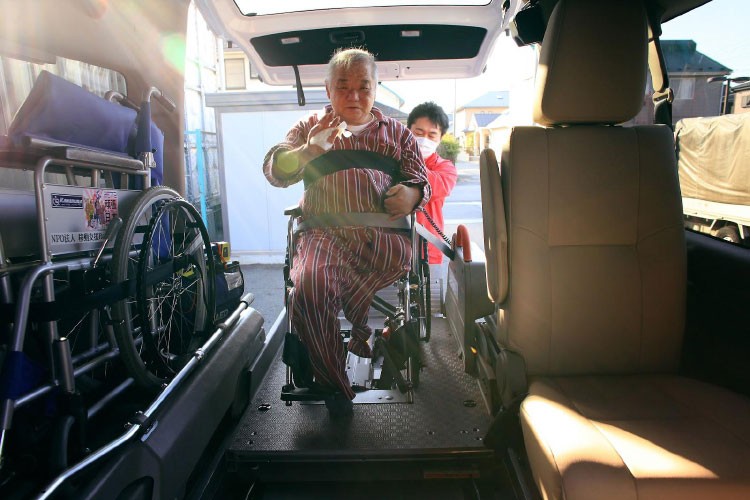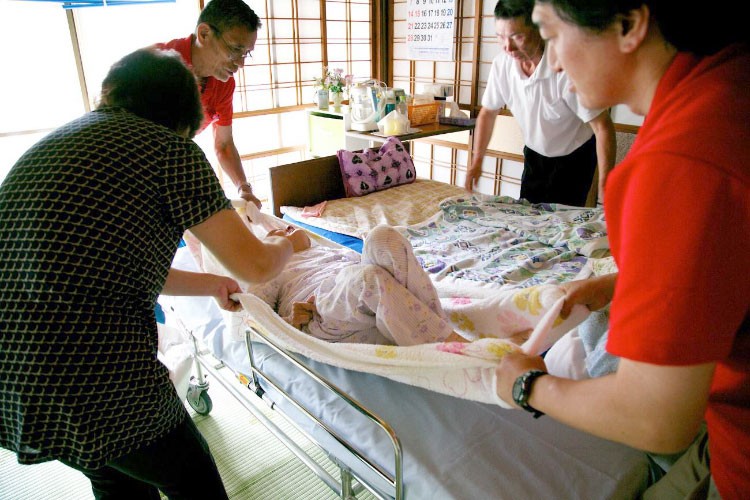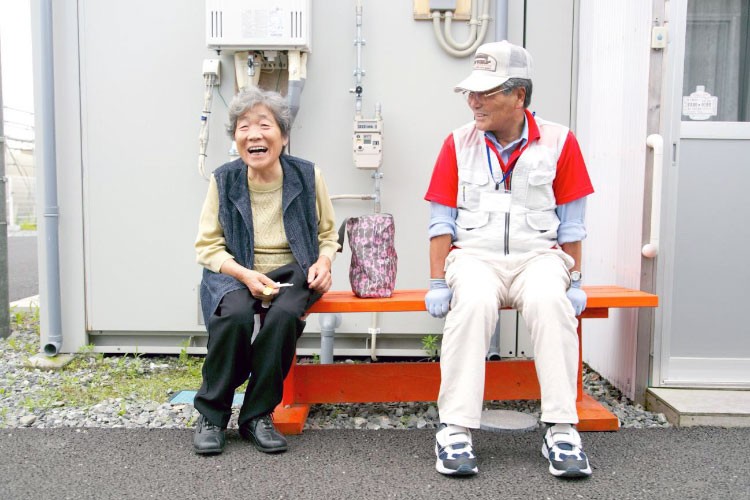Navigating lifelines for the local residents through transportation services Part2 Tohoku Interview: Social Inclusion
Posted on November 14, 2015
by Kris Kosaka
Social inclusion: Empowering the isolated in local communities
A priority of social care within any society is the struggle to include the isolated: the disenfranchised, the disabled, the mentally ill, the elderly or the homeless. In the Tohoku area, over four years since the triple disasters of March 11th, the struggles for those living on the edge of society continues. With so many people within society still needing assistance, from the demands of temporary housing to rebuilding, from compensation issues to the dearth of medical professionals, how are the affected areas ensuring that the voiceless are being heard?

Japan must face its rapidly aging society, with people aged 65 and over predicted to reach nearly 40% of the population by 2060.
The rising elderly population in Japan is a social concern across the nation. Considered by various sources to be the most rapidly aging society in the world (Bloomberg), the Japanese Ministry of Internal Affairs and Communications reported last July the sixth straight drop in population, with “the number of deaths exceeding births by 266,757, the gap widening for the eighth straight year,” according to The Japan Times. These statistics predict that by 2060, people aged 65 or over may reach nearly 40 percent of the population, bringing implications far-ranging across social and economic concerns. Taking steps to ensure the elderly do not become segregated from main society is one step towards social reform.
This commitment has made Rera a successful model of community-centered service for the physically isolated. Nearly four years after the tragedy, Murashima now makes her home in Ishinomaki and another volunteer originally from Hokkaido, Kei Ueno, the assistant manager, has also transferred his family register to Ishinomaki. As Murashima explains, “almost all our staff is from Ishinomaki and practically everyone from Ishinomaki is a disaster victim. Even if they didn’t lose their home, it was damaged by the tsunami. Many of our staff received help clearing mud and debris from volunteers at the time of the tragedy, and they felt inspired by the volunteers, Some people lost their place of work in the disaster so ended up working here. Some of our staff is still living in temporary housing as there is a long wait for builders. One of the young men working here used to be a “hikikomori,” a person who couldn’t leave his home, but now is volunteering here as a kind of therapy. Some are older people living on their pensions.”
Although Murashima is clearly focused on the continuing needs of the affected areas, it’s a lesson applicable across the nation: “we need to raise an awareness of the situation and needs of the people of Ishinomaki. Until I started working here, I had no idea of what the needs were. The more people know about the needs, the more they can find ways to help. Of course funds and personnel are needed, but first we need to find out what the needs are. There is just one university in Ishinomaki- Ishinomaki Senshu University. They offer a course on volunteering for disaster recovery and we’ve had some contact and done some workshops with students taking the course. I’ve learned that there are many ways of volunteering.”

“Often the weakest members of society are the last to ask for help.”
All over Japan, there is an urgent demand for reliable transportation services, but Rera alone can not meet all requests for service, even limited to the one town of Ishinomaki.
All over Japan, there is an urgent demand for reliable transportation services, but Rera alone can not meet all requests for service, even limited to the one town of Ishinomaki.
“At first all I knew was about clearing debris or about supporting the mental care of disaster victims, but now I realize there are many other ways out there to help. Letting people know this is an important task. It’s not just a taxi service, but a holistic way to connect people, to support them in many aspects of their lives. Without reliable transportation, many social issues arise, including disuse syndrome.” Many psychological and physical health issues stem from inactivity, and people in isolated areas are especially vulnerable to disuse syndrome,

Providing transportation is providing community
As Murashima explains, “some live in solitude without social connections. Some have financial problems. Some may stay in abusive relationships or situations. Some lack the knowledge or awareness of possible government assistance, all due to their physical isolation. Through our services, we fill the gaps. I hope the community will see the need for this kind of service and keep it going.”
Writer: Kris Kosaka
Reporter: Kris Kosaka and Yoshiko Ugawa (JNPOC)
Coordinator: Tohru Nishiguchi (JNPOC)
Idoshien Rera is a grantee of the Japan Earthquake Local NPO Support Fund, with its donor the Shinkin Central Bank
Idoushien Rera (Japanese only)
Your comments and feedbacks: Contact Us
Recent Articles
- Shared solutions, stronger communities: Social economy and social innovation in Europe and Japan
- NPO support for disaster victims: Key discussion points
- Beyond support: Fostering genuine dialogues
- Reconsidering the significance of public comments
- Towards a society where children want to embrace life
- The Evolution of Philanthropy: Five approaches shaping contemporary practice